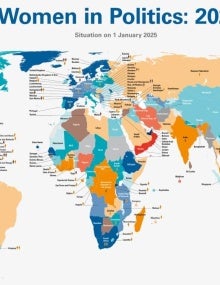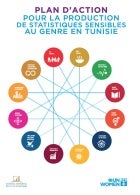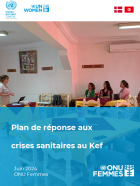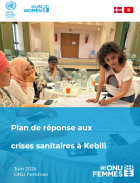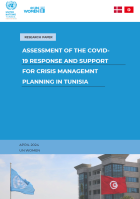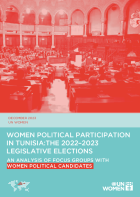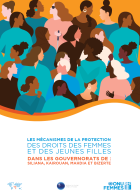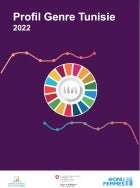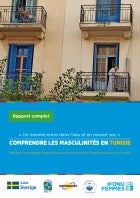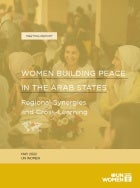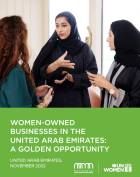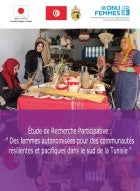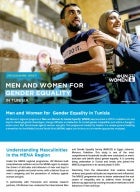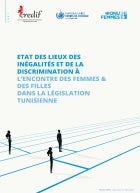1 - 20 of 32 Results
Pagination
Date:
Plan d’Action pour la production des statistiques sensibles au genre en Tunisie
Date:
La pandémie de COVID-19 a posé des défis sans précédent à la Tunisie, obligeant le pays à ajuster ses mesures sanitaires et économiques. La région du Kef, en particulier, a été gravement touchée en raison de ses caractéristiques socio-économiques et géographiques, avec une infrastructure sanitaire limitée et des ressources financières insuffisantes, ce qui a exacerbé la vulnérabilité des populations marginalisées...
Date:
La pandémie de COVID-19 a gravement affecté la Tunisie, nécessitant des ajustements sanitaires et économiques, dont l'impact sur les différentes régions reste à évaluer. La région de Kebili, avec son climat désertique et ses infrastructures limitées, a rencontré des défis uniques...
Date:
The project includes an assessment conducted by UN Women to analyze the pandemic's impact on healthcare, economic participation, social protection, education, and gender-based violence (GBV), with a specific focus on the governorates of Kebili and Kef.
Date:
Women Political Participation in Tunisia: The 2022-2023 Legislative Elections is a study that aims to document the experience of female candidates in the 2022-2023 elections and examine the obstacles they encountered during this electoral process.
Date:
Étude sur « Les mécanismes de la protection des droits des femmes et des jeunes filles » Dans les gouvernorats de : Siliana, Kairouan, Mahdia et Bizerte
Date:
The Swiss Embassy in Tunisia has provided financial support for the UN Women's programme "Contribute to the establishment of a system of collection and production of gender statistics in Tunisia" and within this framework that this study is contributing to the implementation of a system of collection and production of gender statistics in Tunisia in collaboration with strategic partners, mainly the National Council of Statistics.
Date:
Dans le cadre de cette étude, 2 400 hommes et femmes tunisien.ne.s ont été interrogé.e.s, âgé.e.s de 18 à 59 ans, issu.e.s de plus de 120 localités à travers la Tunisie. La recherche comprend également un volet qualitatif qui a impliqué 34 hommes et 27 femmes.
Date:
In May 2022, the UN Women Regional Office for Arab States and the Government of Finland organized a two-day workshop titled “Women Building Peace in the Arab States: Regional Synergies and Cross-Learning” to highlight women’s mediation efforts in their communities and the lessons learned from interventions under the regional WPS programme and the Syria WPS programme.
Date:
Women-owned businesses (WOBs) in the Middle East and Northern Africa (MENA) region could make significant contributions to entrepreneurial activity and countries’ economic growth, but face challenges and barriers. This report examines access to finance in the United Arab Emirates for WOBs; describes government and private measures to promote women’s entrepreneurship; looks at global best practices and makes recommendations for policymakers and stakeholders to improve women-owned businesses’ access to financing.
Date:
L'étude de recherche participative vient répondre aux questions suivantes: Quels sont les besoins des femmes et des jeunes filles au sud Tunisien? Quel est leur rôle dans la cohésion sociale et quelles sont les opportunités économiques pour elles? Elle vient proposer des pistes de solutions pour renforcer l’autonomisation des femmes et leur potentiel de résilience et leur rôle dans la cohésion sociale pour la prévention de l’extrémisme violent.
Date:
This brief presents a short description of the running programme “Men and Women for Gender Equality” in Tunisia, that seeks to mobilize men and boys to challenge gender stereotypes, change attitudes and behaviors to combat gender inequalities, and entice a change in social norms that discriminate against women and girls.
Date:
Le Bureau du Haut-Commissariat des Nations Unies aux Droits de l'Homme en Tunisie, l’ONU Femmes Tunisie et le Centre de recherche, d’études, de Documentation et d’Information sur la Femme(CREDIF) ont conjointement réalisé une étude relative à l’état des lieux des inégalités et de la discrimination à l’encontre des femmes et des filles dans la législation tunisienne en en 2016 puis mise à jour en 2021.
Date:
The objective of this regional assessment is to look at the implications of the macroeconomic response to the COVID-19 pandemic in the Arab region. The regional mapping allows for identification of the dominant trends and policy priorities across different areas of interventions and looks at the potential implications of [largely] gender-blind macroeconomic responses and investments during the first six months of the pandemic.
Date:
This desk review summarises global and regional trends and best practices and techniques for reaching out remotely to women and girls who experience violence, including during lockdowns and to survivors of online violence.
Date:
This study and brief aim at providing insights on how gender and other intersecting inequalities impact the risk and vulnerability to HIV for women and girls in Africa.
Date:
Ce Policy Brief met l’accent sur les différentes formes d’impact de la COVID-19 sur la santé des femmes en Tunisie. Durant la première période de l’épidémie, de nombreuses prestations sanitaires ont été reportées tandis que le personnel hospitalier se consacrait à la préparation des services de santé pour s’attaquer à la COVID-19.
Date:
Le rapport a pour objet une veille normative sur les différentes mesures prises en Tunisie pour faire face à la crise de la Covid-19 durant la première vague (mars - août 2020) sous l’aune de l’approche genre.
Date:
Il est vrai que les soins dans le secteur public ont connu une amélioration en termes d’existence de structures sanitaires et de centres de santé de base répartis sur l’ensemble du territoire. Toutefois, les violences dans certaines de ces structures, dont le milieu obstétricale, sont fréquentes et laissent des cicatrices invisibles mais douloureuses.
Date:
Women play an outsized role in the care economy in the Arab States, performing 4.7 times more unpaid care work than men – the highest female– to–male ratio anywhere in the world.
